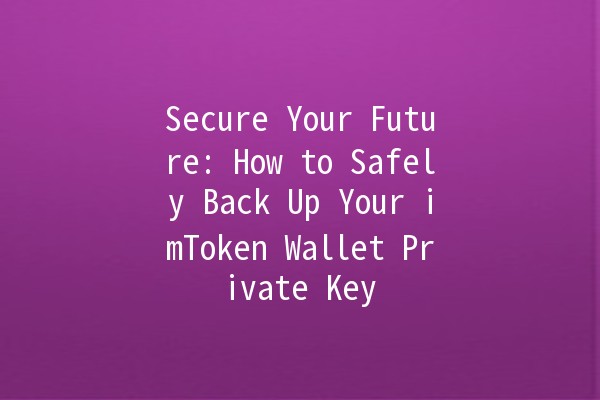In the rapidly evolving world of cryptocurrencies, protecting your assets is paramount. One of the essential steps in safeguarding your digital currency holdings is to ensure your private keys are backed up securely. For users of imToken, a popular wallet choice, understanding the methods of private key backup is vital for maintaining access and ensuring the safety of your funds. This article provides practical tips on how to back up your imToken wallet private key effectively, along with strategies to enhance your overall productivity in managing your cryptocurrency assets.
A private key is a critical component of your cryptocurrency wallet. It serves as proof of ownership of your assets and allows you to perform transactions within the blockchain network. Without your private key, access to your wallet is lost, which can result in permanent loss of funds. Therefore, implementing a robust backup solution is crucial.

Security: Your funds are safe only as long as your private key is secure.
Accessibility: Losing your private key means losing access to your cryptocurrency, often irretrievably.
Peace of Mind: Knowing you have your keys backed up allows you to manage your assets with confidence.
Explanation: One practical approach to backing up your private keys is through secure cloud storage. Platforms such as Google Drive or Dropbox provide accessibility from multiple devices but come with security considerations.
Application Example:
Step 1: Write down your private key in a text document.
Step 2: Upload this document to a cloud storage service with encryption enabled.
Step 3: Use twofactor authentication (2FA) for your cloud account to add an extra layer of security.
Productivity Enhancement Tip: Use tags and folders within your cloud storage to organize your cryptorelated documents for easy retrieval when needed.
Explanation: For those who prioritize security, using hardware wallets like Ledger or Trezor offers an offline solution for storing private keys. Hardware wallets are designed specifically for secure key management.
Application Example:
Step 1: Buy a reputable hardware wallet from a trusted vendor.
Step 2: Follow the manufacturer’s instructions to initialize the wallet and transfer your private key.
Step 3: Store the hardware wallet in a secure physical location, such as a safe.
Productivity Enhancement Tip: Regularly update your hardware's firmware to ensure optimal security protection against emerging threats.
Explanation: A traditional yet effective method is to physically write down your private key on paper and store it securely. This method minimizes risk from cyber threats but requires physical security measures.
Application Example:
Step 1: Write your private key down on a piece of paper.
Step 2: Place this paper in a fireproof and waterproof safe.
Step 3: Consider duplicating this paper and storing it in another secure location, like a safe deposit box.
Productivity Enhancement Tip: Use a numbering or naming system that allows quick reference without revealing sensitive information to unauthorized individuals.
Explanation: Utilizing password managers like LastPass or 1Password allows you to store not only your passwords but also sensitive notes securely. Most password managers use strong encryption standards.
Application Example:
Step 1: Create a secure entry in your password manager for your private key.
Step 2: Enable twofactor authentication on your password manager account.
Step 3: Regularly check for security updates from your password manager provider.
Productivity Enhancement Tip: Regularly review and update your stored entries to ensure everything is current and to delete any outdated or unneeded information.
Explanation: Diversifying your backup methods provides additional security. Relying on multiple solutions ensures that if one fails, you have alternatives.
Application Example:
Step 1: Choose a combination of the above methods (e.g., cloud storage and physical paper backup).
Step 2: Maintain a consistent schedule to ensure that all backups reflect the latest information.
Step 3: Document the location of each backup method for easy access while ensuring your notes are also securely stored.
Productivity Enhancement Tip: Set calendar reminders to review and possibly update your backup methods to reflect any changes in your digital asset management practices.
Losing your private key can lead to total loss of access to your funds. There’s no recovery option since private keys are designed to be secure. Always ensure you have secure backups before attempting to access your wallet.
While software wallets offer convenience, they tend to be more vulnerable to online threats. If you use a software wallet, ensure you have strong passwords, enable 2FA, and consider complementary hardware or paper backups.
Your backups should reflect any changes in your wallet. Each time you receive new crypto assets or make significant changes, or periodically (e.g., every few months), ensure you have updated your backup methods in accordance with your latest activities.
Storing a private key directly on your computer poses significant risks if your device is compromised. Instead, explore secure methods like hardware wallets or encrypted backups to mitigate these vulnerabilities.
Never share your private key with anyone. It is your sole access to your crypto assets. Sharing it exposes your wallet to unauthorized access and potential theft.
Always use secure storage practices: enable encryption, set strong passwords, and maintain duplicates in different secure locations. Regularly review your security measures and stay informed about potential threats.
Taking the time to back up your imToken wallet private key is an essential step toward ensuring the security of your cryptocurrency assets. Utilizing a combination of methods enhances your ability to protect your investments from loss. By implementing these strategies, you not only safeguard your assets but can also manage your cryptocurrency journey with a greater sense of security and confidence.